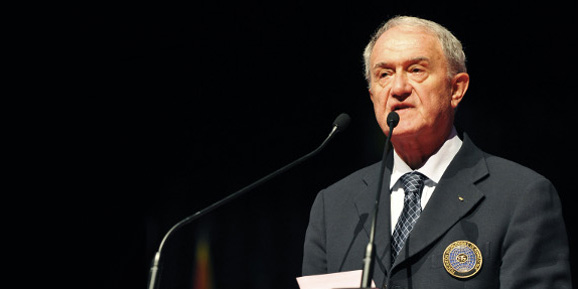Dear friends,
Lessons from London, I would like, if I may, to share a few thoughts and impressions from the London 2012 Olympic Games, in the hope that these will help to identify aspects where we fell short and enable us to find appropriate solutions.
In terms of the standard of judging, I can say that, with just a few exceptions, we had every reason to be satisfied. I was particularly impressed by the Rhythmic Gymnastics judging panels. There is no doubt that this owes much to the decision of the IOC to reduce the number of judges and the measures taken to ensure neutrality. The measures put in place ensured that none of the judges were the same nationality as any of the competing athletes. This had a positive effect on the quality of the judging and also had psychological benefits, as it eliminated any hint of suspicion.
Having said that, ahead of the Olympic Games, concerns were raised in certain quarters about the selection of the judges, with some predicting the worst. Such concerns proved unfounded. The judges executed their responsibilities commendably. Could they have done better? Suffice to say they showed themselves up to the task, and coped well with all of the pressures that judges are exposed to. We now eagerly await the new Codes of Points, in the hope that these will help facilitate even higher standards of judging going forward.
The judging in the Trampoline Gymnastics is worthy of special praise – I was delighted to see everything function so smoothly in this discipline.
Turning to Artistic Gymnastics, I must, by contrast, express my regret and disappointment at the incident relating to the score awarded to Japanese gymnast Kohei Uchimura in the Team Pommel Horse. This disagreeable situation unfolded right before the eyes of the IOC President, who was present in the arena.
We urgently need to undertake a comprehensive review of the way we handle appeals. We need to have in place more rigorous controls to ensure that our directives are acted upon by the coaches, so that the spectacle of coaches crossing the competition area, waving banknotes in the air, is not something that is ever repeated. This was triggered by an extreme situation, which arose in the last second of the final routine of the last gymnast to compete for Team Japan, on the final piece of apparatus, the Pommel Horse! The appeal, which, I should stress, resulted in a change in the medal positions, did not merit the overly protracted period of analysis which followed!
There will, after all, always be disagreements among the judges regarding the award of a fraction of a point that can improve the overall team score. The ambiguity of this situation is not lost on anyone: not the thousands of spectators in the arena, nor the millions watching at home on TV, nor indeed the three hundred or so journalists who were at the venue to cover the event.
I would also like to touch on the appeal by Team USA over the score awarded to Alexandra Raisman in the final of the Beam. The Jury accepted the appeal, which meant that Raisman ousted Romania’s Catalina Ponor from the bronze medal position on the podium. The issue here was Raisman’s difficulty score evaluation, which, from the jury’s perspective, did not exist. This type of situation can give rise to debate and the competition setting is not a courtroom where everyone can put forward their case. There are, after all, situations where a jury simply has to be left to deliberate in peace and without external interference of any sort.
In cases such as this one the principle of sporting justice can be compromised. The fact is that a sport without rules and without fairness is no longer a sport. The FIG has made real strides here in recent years, but I am fully aware that we still have work to do on what remains a sensitive issue.
With every year, I have seen an improvement in the quality of the judging. Ignorant practices are on the wane, while the letter and spirit of the sport are gaining ground with every passing day – this is something that gives me cause to rejoice.
I am also exercised by the rules applied in tie-break situations. Do we really need to separate two gymnasts who are locked together on identical scores, down to a thousandth of a point? Take, for example, Mustafina and Raisman in the final of the All-around competition, who were locked together on 59.566 after the four pieces of apparatus. There was a similar situation with Mustafina and Ferrari in the final of the women’s Floor exercise; then there was the case I referred to above involving Raisman and Ponor in the Beam, not to mention the situations involving Berki/Smith and Uchimura/Ablyazin.
The issue of how to resolve ‘dead-heat’ situations has long given risen to debate, but the FIG has taken a firm position, and chosen to adhere to the principle of equal ranking. In doing so, it has elevated sporting spirit above the letter of the rules and regulations, which are, after all, sometimes too black and white and too rigid. The stance adopted by the FIG in this regard has certainly been appreciated by the medal winners at our various World Championships.
Going back to London 2012, I would like to relay my congratulations and my sincere gratitude to LOCOG, to our technical partners, and not least to the FIG staff team for helping to ensure such high standards in the gymnastics competitions, which have been unanimously praised.
I would like to finish by saluting the veritable army of fantastic volunteers at London 2012, who continually impressed me with their efforts throughout the course of the Games.
With best wishes,
FEDERATION INTERNATIONALE DE GYMNASTIQUE
Prof Bruno Grandi, President


Leave a Reply
You must be logged in to post a comment.